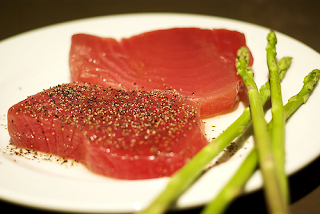Currently there are over ten kinds of trace minerals identified, but not all of them have been scientifically proven to have any health benefit. Listed below are the ones that have.
Iron
 |
| Red meat is a source of iron. |
RDA: Adult men: 8 mg/day, women aged 19-50: 18 mg/day,
women aged >50: 8mg/day, pregnant women: 27 mg/day
Iron is an important component for proteins and enzymes. It's required to make hemoglobin, the pigment that carries oxygen in red blood cells. The main sources of iron are red meat, eggs, fish, leafy green vegetables, beans, and grains.
Zinc
RDA: 11 mg/day
Zinc is required for immunity and nerve function. It's important for reproduction. It is found in red meat, calf liver, eggs, oats, asparagus, green peas, and scallops.
Iodine
RDA: Adult: 150 micrograms/day, pregnant women: 220 micrograms/day
Iodine is important for the synthesis of thyroid hormones. The thyroid hormones in turn regulates the body's growth and metabolism. The main sources of iodine are iodized salt and sea products.
Manganese
RDA: Adult men: 2.3 mg/day, adult women: 1.8 mg/day
Manganese is required for enzyme functions, cartilage and bone formation, and wound healing. The main sources of manganese are green leafy vegetables, grains, brown rice, nuts, soybeans.
Copper
RDA: 900 micrograms/day
Copper is required for development of connective tissues, enzyme function, and iron metabolism. The main sources of copper are seafood, whole grains, mushrooms, nuts and seeds.
Selenium
 |
| Tuna has the second highest selenium content after brazilian nuts. |
RDA: 55 micrograms
Selenium is important for thyroid function and supports antioxidant activity. It is found in tuna, cold water fish (cod, halibut, salmon), turkey, calf liver, barley, garlic, broccoli, and seeds. Brazilian nuts have especially high selenium content.
Molybdenum
RDA: 45 micrograms/day
Molybdenum is a component of the enzyme sulfite oxidase that helps break down chemical toxin ingested from preserved food. It is found in tomatoes, carrot, green leafy vegetables, and onions.
Chromium
RDA: Men aged 19-50: 35 micrograms/day, men aged >50: 30 micrograms/day,
women aged 19-50: 25 micrograms/day, women aged >50: 20 micrograms/day
Chromium boosts metabolism and helps control blood sugar levels. It is found in apples, spinach, oyster, red meat, and eggs.